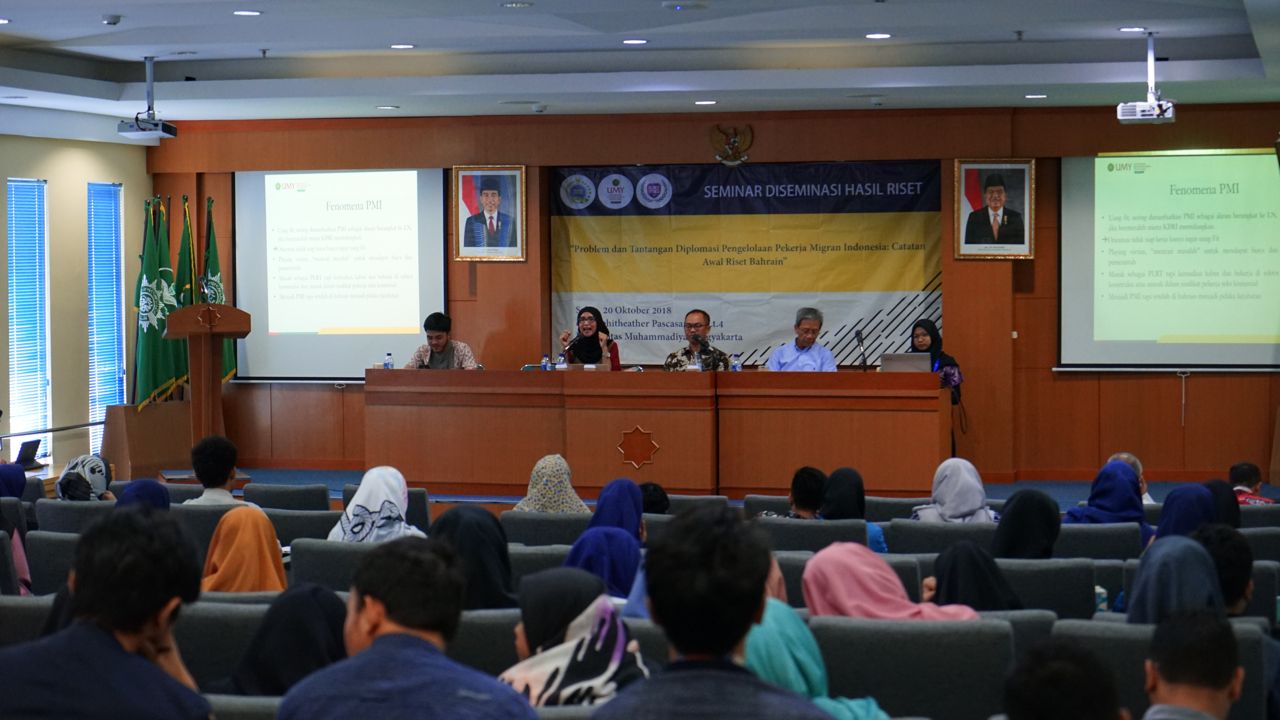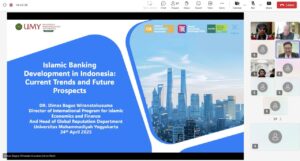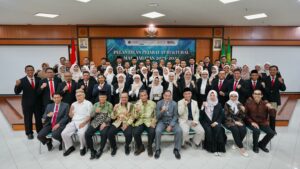According to Ministerial Regulation (Permen) No. 260/2015 on Termination and Prohibition of Indonesian Migrant Worker Placement for Individual Users, Indonesian government has officially prohibited Indonesian migrant workers to individual users to the Middle East regions since February 2015. However, illegal Indonesian worker placement to the Middle East remains to take place. For instance, at the beginning of 2018, Ministry of Manpower counteracted placement of Indonesian migrant workers to the Middle East such as Bahrain. Noticing the fact, lecturers of Department of International Relations of Universitas Muhammadiyah Yogyakarta (UMY) Ratih Herningtyas, S.IP., M.A. and Ade Marup Wirasenjaya, S.IP., M.A. and their students Amalia Putri Utami and Heriawan conducted research on Diplomacy of Indonesian Worker Migrant Management in Bahrain. Then, they disseminated their research findings in a seminar on Saturday (20/10) at Seminar Hall of Kasman Singodimedjo Building of UMY. Indeed, the dissemination was a follow up of their visit to Bahrain on 21-29 September.
At the seminar, the Indonesian Embassy to Bahrain Nur Syahrir Rahardjo stated that more and more illegal Indonesian migrant workers were sent to Bahrain. “Even though Indonesian government has carried out a moratorium policy on Indonesian migrant worker dispatch as housemaids or assistants to the Middle East, including Bahrain, many parties sent the workers without proper procedures. In fact, the number of workers rises, 4,547 people,” declared Nur.
Nur contended that the increasing number was due to push and pull factors from both countries. “Push factors emerging from Indonesia are economic issues, low educational levels, limited employment, illegal agents, and lack of parents’ or a spouse’s care, while pull factors coming from high demand for house assistants in Bahrain, the level of prosperity and lifestyle in Bahrain, and roles of Indonesian workers in worker agents,” he mentioned.
Meanwhile, the Indonesian migrant worker dispatch occurred after the moratorium. “After the moratorium, the Bahraini government still issues work visas for Indonesian citizens to work in non-formal sectors opposite to policy by Indonesian government. This happened because of several aspects. First, Bahraini culture views that having house assistants is prestigious so that Bahraini people rely on the assistants and urge their government. Second, there is a pressure from agents afraid of losing their job since they gain huge profits from the illegal business,” presented Ratih.
Ratih informed that handling Indonesian migrant worker issues is harder. “Before the moratorium was enacted, the migrant worker dispatch was carried out legally that the workers had to provide legal and certified documents so that the number could be recorded and controlled. An employment contract was also clear and was recognized by employment agencies. However, after the moratorium was upheld, a lot of document frauds happened so that many Indonesia workers were not on data of Indonesian government. Many workers did not possess unclear contracts or did not understand their employment contract,” explained Ratih.
“As the result, the workers confronted problems, the agents did not care and let the Indonesian embassy (KBRI) solve it. The embassy cannot do many things to assist workers without an employment contract. It is hard for the embassy to mitigate to prevent or solve the issues so that the alternative solution is through mediation or court often neglecting the workers’ rights which their employer has yet given,” emphasized Ratih.
At the seminar, Ratih and the other researchers provided some recommendations to avert the similar issues to reoccur. “In order that the workers do not face any problems during their work, firstly, education and training to enhance their professional and communication skills are necessary. Secondly, we can defer a passport proposal service for workers potentially causing problems. Thirdly, checking should be more careful to prevent the illegal migrant worker dispatch. Fourthly, giving a stamp of one way on a passport of workers potentially causing problems so that they cannot use the passport anymore when returning to Indonesia,” mentioned Ratih.







